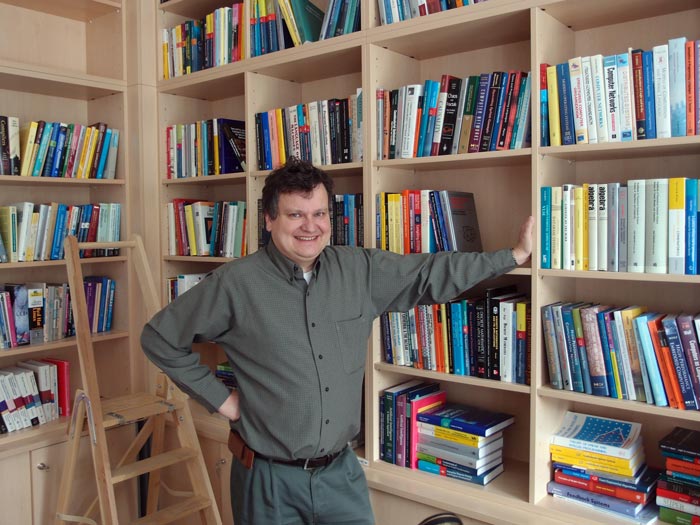June 12, 2012
Wittgenstein Award for Thomas Henzinger
Most important Austrian Science Prize awarded to IST President • Award for internationally acclaimed computer scientist

Thomas Henzinger is one of the two Wittgenstein Award Laureates of 2012. This was announced by the Federal Minister for Science and Research, Karlheinz Töchterle, and Christoph Kratky, President of the Science Fund FWF, at noon today. The President of the Institute of Science and Technology (IST) Austria receives the most important Austrian science prize together with the physical chemist Niyazi Serdar Sariçiftçi at the University Linz. In a first reaction, Henzinger said: “I thank the Wittgenstein jury for this award. I regard it not only as a recognition and motivation for my own research, but also as an honor for my entire team.” Apart from his activities as IST President, the computer scientist leads a research group of currently five Postdocs and two PhD students. Of particular scientific interest to Henzinger are mathematical models for the improvement of software quality.
Thomas Henzinger was born in 1962 in Linz, Upper Austria. He completed his degree in Computer Science at the Johannes Kepler University Linz with distinction. After receiving a Master of Science in Computer and Information Sciences from the University of Delaware, Thomas Henzinger was awarded his doctorate in Computer Science at Stanford University in 1991, graduating from one of the best institutes in this field worldwide. He was then appointed Assistant Professor of Computer Science at Cornell University (1992-95), and later Assistant Professor (1996-97), Associate Professor (1997-98), Professor (1998-2004), and (2004-2011) Adjunct Professor of Electrical Engineering and Computer Sciences at the University of California in Berkeley. From 1999 to 2000, Henzinger acted as Director of the Max-Planck Institute for Computer Science in Saarbrücken, Germany. In April 2001, he was appointed Professor for Computer and Communication Sciences at ETH Lausanne (EPFL), Switzerland. At the end of 2008, Thomas Henzinger was appointed President of the Institute of Science and Technology Austria, a role he officially assumed in 2009.
Thomas Henzinger is one of the ISI Highly Cited Scientists. Microsoft Academic Search lists him as one of the 100 most productive scientists worldwide in the research fields of software-engineering, real-time and embedded systems, and theoretical computer science; according to Google Scholar three of his publications have been cited more than 1000 times, 12 publications more than 500 times and over 50 publications more than 100 times. In 2010, Henzinger was awarded an Advanced Grant of the European Research Council. Henzinger is Member of Academia Europaea, the German National Academy of Sciences Leopoldina and the Austrian Academy of Sciences, and he is Fellow of the Association for Computing Machinery (ACM) and the Institute of Electrical and Electronics Engineers (IEEE).
Professor Henzinger’s main research area is the development of formal methods for the verification of programs and systems. This field of computer science deals with the improvement of reliability in soft- and hardware systems. Henzinger develops new theories, algorithms and tools for error detection in computer programs. Furthermore, Henzinger has made significant contributions in the fields of concurrent and embedded systems; fundamental mathematical theories for the modeling of process control software are attributed to Henzinger. Recently, he has also addressed several other disciplines, such as the fields of game theory, systems biology and new programming models. Besides other achievements, he has coined the concept of “Executable Biology”. This describes the attempt to model the interaction of molecules or cells with the help of algorithmic descriptions of the corresponding processes.
Henzinger is part of the National Research Network (NFN) “Rigorous Systems Engineering” (RiSE) together with eight other scientists and their groups at five different Austrian research institutions. The scientists organized in this platform have made it their task to further the research on formal methods for the development of correctly functioning computer systems – a topic with high potential for applications, as computer software is used in more and more sensitive areas. Thanks to this initiative, Austria is regarded as one of the leading research locations in this field.
The Wittgenstein Award is associated with up to 1.5 Mio Euro of financial support. It is awarded each year by an international jury on the basis of international appraisals. The program serves to honor and support scientists working in Austria, who have accomplished outstanding scientific achievements and are of high standing in the international scientific community of their discipline. The award is not bound to a research proposal and, through its high degree of freedom and flexibility, supports the pursuit of “blue sky”-projects, scientific research beyond the horizon of our current knowledge.



